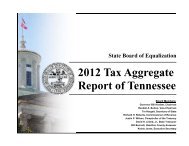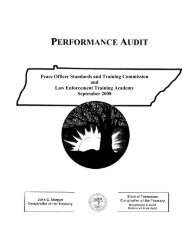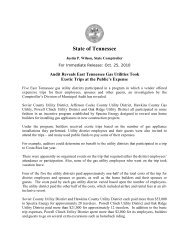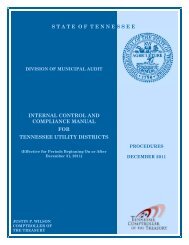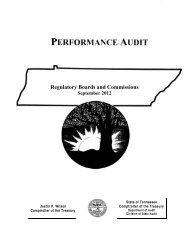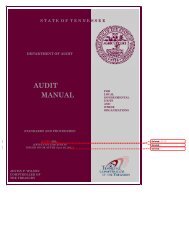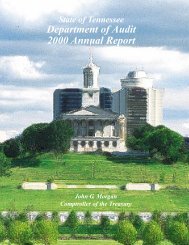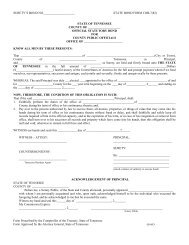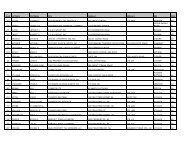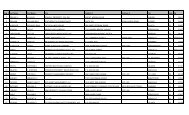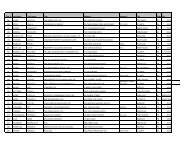On 06/30/2013 the Audit Manual was updated. For a markup copy ...
On 06/30/2013 the Audit Manual was updated. For a markup copy ...
On 06/30/2013 the Audit Manual was updated. For a markup copy ...
Create successful ePaper yourself
Turn your PDF publications into a flip-book with our unique Google optimized e-Paper software.
<strong>Audit</strong> Procedures – Section APP.C<br />
3. <strong>Audit</strong> Considerations - State of Tennessee Subrecipient Contracts<br />
State Subrecipient Contracts<br />
In auditing subrecipient funds received from <strong>the</strong> State of Tennessee that are subject to audit, <strong>the</strong><br />
auditor should become familiar with <strong>the</strong> program and <strong>the</strong> related requirements of <strong>the</strong> state<br />
department funding <strong>the</strong> program. The following list represents points of interest <strong>the</strong> auditor<br />
should consider in preparing <strong>the</strong> audit program for state subrecipient funds.<br />
1. Program funds (subrecipient contracts, loans, commodities, etc.) received from<br />
<strong>the</strong> state may include both state and federal dollars. The federal portion does not<br />
lose its identity simply because it flows through <strong>the</strong> state; <strong>the</strong>refore, federal funds<br />
should be audited in accordance with <strong>the</strong> applicable OMB requirements.<br />
2. A portion of state dollars disbursed may represent matching funds. These funds<br />
are governed by <strong>the</strong> same requirements as <strong>the</strong> related federal program.<br />
3. In-kind contributions may or may not be allowable as <strong>the</strong> entity’s matching share<br />
for a program.<br />
4. Calculations for determining matching shares may vary between contracts, and<br />
different rates for different cost categories may be applicable for a single<br />
contract.<br />
5. Indirect cost allocation plans must be approved by <strong>the</strong> grantor.<br />
6. Most subrecipient agreements require <strong>the</strong> entity’s accounting system to provide<br />
for separate and identifiable account balances for each contract with subsidiary<br />
ledgers for each project within a contract. Grantor reports should agree with<br />
<strong>the</strong>se accounts.<br />
7. <strong>On</strong>e entity may apply for subrecipient funds, but ano<strong>the</strong>r entity may ultimately<br />
use <strong>the</strong> funds (pass-through funds). The entity that applies for <strong>the</strong> funds is<br />
responsible for ensuring <strong>the</strong> funds are used in compliance with grantor<br />
guidelines. The entity should report <strong>the</strong>se funds in accordance with applicable<br />
accounting guidelines.<br />
8. Certain program revenue information can be obtained on <strong>the</strong> web at:<br />
http://www.comptroller.tn.gov/la/Confirmations.asp<br />
Additional information may be confirmed directly with each grantor. A list of<br />
<strong>the</strong> telephone numbers of <strong>the</strong> state departments that most frequently administer<br />
subrecipient funding can be found on <strong>the</strong> internet. (GRANTOR<br />
INFORMATION) The auditor should request confirmation not only of <strong>the</strong><br />
amount of advances, subrecipient funds received, and <strong>the</strong> year-end receivable<br />
balance, but also <strong>the</strong> appropriate Catalog of Federal Domestic Assistance<br />
APP.C-5



